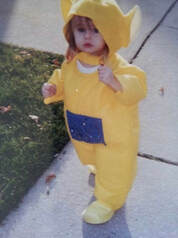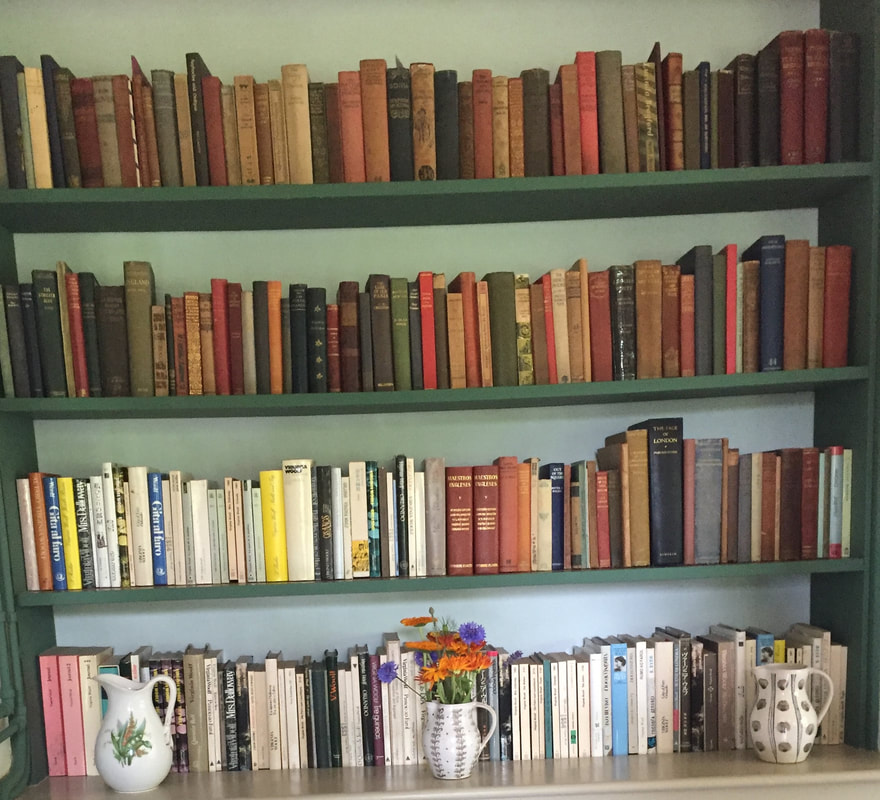 by Rachel Barton While I was growing up, my mother made all of my Halloween costumes. Since she was a seamstress, she took this opportunity to go all out and produce works of art. For my first Halloween, I was a tiny bride with a complicated wedding dress. Throughout the years, I dressed as a Teletubby with a light up belly, Tom and Jerry in one costume, and a princess turned ninja. Each year, my mom would ask me what I wanted to be. When I was nine, I stumped her. For the 364 days that I wasn’t modelling my mother’s creations, I was an avid reader. As a child, I burned through fantasy books. My shelves were stocked with The Harry Potter Series, The Chronicles of Narnia, The Lord of the Rings, The Inheritance Cycle, and Tales from Earthsea. My favorites, from thrift stores, bore cracked spines and yellowed pages. These felt the most magical to me, as if they were imbedded with the love and dreams of their previous owners. Whether sneaking a book at school or under the covers, I was almost always running around magical lands with dragons, wizards, and trolls. When I was nine, perhaps in the height of my high fantasy craze, I told my mom that I wanted to be a dragon nurse. She, as you might, had no idea what I was talking about. I went on to describe a type of mage with an inherent affinity for beasts. Although they could work with any creature, dragon nurses chose to serve the greatest beasts of all—dragons. A dragon nurse would protect eggs and care for the new hatchlings, even feeding them enchanted milk from a sack. Once she felt she understood the concept, she whipped me up a costume. The several layers doubly served to keep me warm on a cool October night and to suitably fit a fantasy aesthetic. I looked mostly like a witch drenched in deep burgundies and cream. Circling my sleeves, pant legs, and collar were fine, bronze-colored dragons. She completed the costume with a sack for dragon milk (just add glitter and food coloring) and a larger bag to carry unhatched eggs (more sequins than you can imagine). That night, I didn’t even care about candy. I didn’t care that no one knew what I was dressed as. I ran my fingertips over the stitched dragons and checked on my fake egg every fifteen minutes. I felt like I was a part of that story, part of that world. The costume simply allowed me to be my truest self, to show everyone else that I was something magical. That’s the appeal of high fantasy. The often massive works with extensive series allow you to dive into a world deeper than the Mariana Trench. You walk along-side characters, recite spells, and fight the forces of evil. Sometimes you even learn languages that only people of your world could understand. In that world, you fit perfectly. As an awkward, chubby kid, fantasy books allowed me to have friends and explore in ways that I couldn’t in the real world. I could examine different moral standpoints, identities, and career paths. The pages created a place for me that was familiar enough for me to feel comfortable, but different enough that I could feel special. Isn’t that what we all want? Since I was reading so much fantasy, it makes sense that I was writing so much of it, too. After all, I wanted to be a part of that world. I wanted to make my own world. Trust me when I say that this writing was bad. It contained all the signposts of high fantasy, but obviously lacked the complicated themes and mastery of language and world-building that would denote good high fantasy. When I wrote, I was just playing. And it was fun. But that writing was by no means meant for general consumption. I’m not the only writer who fell into this trap. In classes and workshops, I’ve encountered countless authors who produce stories much like the ones I dreamed up in middle school. Misled by their own love of the genre, writers create facsimiles of high fantasy. We are so desperate for the feeling of magic and belonging we love when reading that we are blinded to the mistakes we make when writing. Even if writers don’t copy a story directly, they overwhelmingly draw from European medieval history and aesthetics while toting the same ideas and recyclable characters we’re so familiar with. Many people argue that every story is a reimagining and borrows from other stories. I agree, but I think this process is exponentially increased in genre writing. Here, it leaves a particularly bad taste in my mouth. Genre writing generally allows for far more imagination and creativity than more realistic writing. And yet, in all that freedom, writers are presenting the same stories, characters, and problems that we’ve been reading for years. However, these writers are going a major step farther. They’re taking their exercises in nostalgia and attempting to share them with the public, believing that they have, this time, created the Next Best Fantasy Series. In some instances, they succeed in getting them published, adding to the masses of bad fantasy on shelves and devaluing actually good fantasy. The propagation of poorly written fantasy writing preys on readers most of all; it asserts that we will accept any haphazardly pieced together story with a dragon in it. I know that we deserve more.
We deserve authors who understand our relationship with fantasy do it justice. These authors exist. They take the traditional concepts and elevate them. Does everyone in this made up place need to be white? No, of course not. Do all the women need to be treated horribly because “that’s how things are in a society like this?” Absolutely not. Does every single high fantasy book need to pull from European medieval aesthetics and traditions? Please, please no. I am so beyond sick of knights. Great writers, like Kendare Blake, Nnedi Okorafor, and Lev Grossman, take everything we love about high fantasy and challenge it to make it better. They can recognize the sense of wonder and community that so ensnared us without perpetuating the clichés and pitfalls. Not only are they challenging the conventions of the genre, but they are also encouraging readers to think differently. As you pick up your pen or open your laptop, dreaming of Middle Earth, I urge you to look deeper. Look past the witches and centaurs dancing around your brain and actually focus on your writing. Is it good? Is it good enough to sit on the shelves next to Neil Gaiman and V.E. Schwab? Is your writing intentional and crafted or are you like me, tracing your thread dragons to feel magic for just a little longer?
0 Comments
Leave a Reply. |
Archives
July 2024
Categories
All
|
|
Glassworks is a publication of Rowan University's Master of Arts in Writing 260 Victoria Street • Glassboro, New Jersey 08028 [email protected] |
All Content on this Site (c) 2024 Glassworks
|



 RSS Feed
RSS Feed
